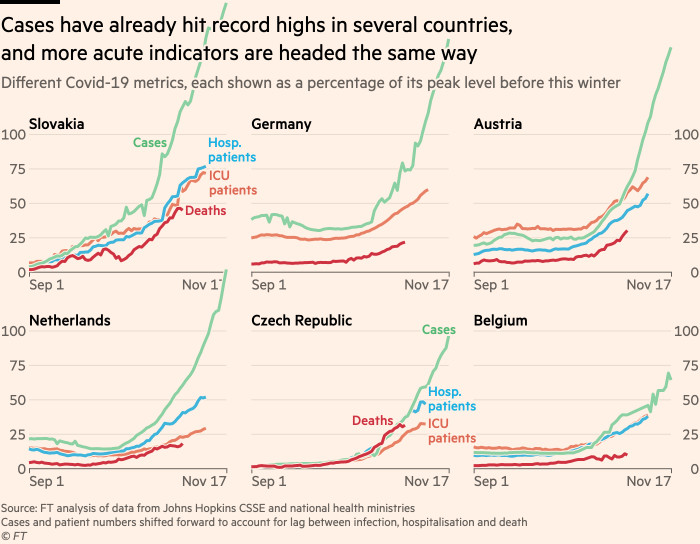The surge in Covid cases across Europe is forcing governments to take drastic measures, with Austria on course to become the first country in the continent to make coronavirus vaccines mandatory in an effort to curb infections.
Vaccines would be required for all Austrians from February 1, with the country also reimposing a strict lockdown. The plans are the most far-reaching of new measures taken by European nations to ease pressure on hospitals, with Belgium, Germany and Norway among the countries beefing up controls.
The Austrian plans come as the EU’s medicines regulator said member states were cleared to use Merck’s antiviral pill to treat Covid-19.
Alexander Schallenberg, Austria’s chancellor, said on Friday it was time “to face reality” as he announced the new three-week lockdown and said a “general obligation” would apply for all Austrians — where rates of vaccination are among the lowest in western Europe — to get a jab under laws that could be approved within months.
“The political consensus has been against compulsory vaccination in this country and I also believed people should be persuaded to be vaccinated . . . for the protection of society. But despite campaigns [too many] people have still not been vaccinated,” the chancellor said, following late-night discussions with Austria’s state governors.

Austria currently offers jabs to anyone over the age of 12. About a quarter of Austrian adults are yet to be fully inoculated.
No details of how the “general obligation” for vaccination will apply have been made public. So far only Indonesia, the Federated States of Micronesia, Turkmenistan and Tajikistan have made vaccinations compulsory.
Schallenberg’s government is likely to face a difficult political battle as it races to get the necessary legislation in force, despite broad support from the leading opposition Social Democratic party.
The mandate is likely to be fiercely resisted by the populist rightwing Freedom party, which has become increasingly outspoken against pandemic-related restrictions in recent months.
“The government is crossing a dark red line, throwing the basis of our federal constitution overboard and leading the country coldbloodedly into a dictatorship,” said party leader Herbert Kickl, who is currently housebound after testing positive for coronavirus.

Austria is part of a cluster of wealthy — and mainly German-speaking — nations at the heart of Europe with poor vaccination rates.
In Germany, which has experienced a surge in cases over the past week, the air force is preparing aircraft in case they are needed to transport Covid-19 patients from the worst-affected areas to regions with more hospital beds, local media said.
Chancellor Angela Merkel and Germany’s 16 federal state leaders announced on Thursday that hospitalisation rates would be used to determine new coronavirus restriction measures.
Norway said on Friday that it would tighten requirements to enter the country and all citizens aged over 65 would receive a third vaccine dose before Christmas. And Denmark’s government said it would require vaccine passports for use in public sector workplaces.
Also on Friday the European medicines regulator cleared the way for EU nations to use Lagevrio — Merck’s antiviral pill for Covid-19 — which has been proven to halve the hospitalisation and death risk of the virus, to treat at-risk patients.
The European Medicines Agency said it issued the advice “to support national authorities who may decide on possible early use of the medicine prior to marketing authorisation . . . in light of rising rates of infection and deaths due to Covid-19 across the EU.”
Slovakia and the Czech Republic set out new restrictions on Thursday. And Belgium has imposed a four-day homeworking rule to come into force next week.
Austria will enter a lockdown on Monday, with all bars, restaurants, non-essential shops and entertainment venues closed until December 13. The measures will be reviewed after 10 days.
Schools will remain open. After December 13, and regardless of any measures to reduce restrictions, unvaccinated people will continue to be ordered to stay at home and banned from public indoor spaces.
Austria reported a new record of 15,145 daily infections on Thursday, giving the country a rolling seven-day average of 12,616 daily new cases, or 141 cases per 100,000 residents — more than triple the EU-wide average — according to Johns Hopkins University.
https://news.google.com/__i/rss/rd/articles/CBMiP2h0dHBzOi8vd3d3LmZ0LmNvbS9jb250ZW50L2FjYWE2NzdkLTgwN2UtNDljMi04MDZhLTM0MTFjNmMwNjVhNdIBP2h0dHBzOi8vYW1wLmZ0LmNvbS9jb250ZW50L2FjYWE2NzdkLTgwN2UtNDljMi04MDZhLTM0MTFjNmMwNjVhNQ?oc=5
2021-11-19 21:00:21Z
1108945934
Tidak ada komentar:
Posting Komentar